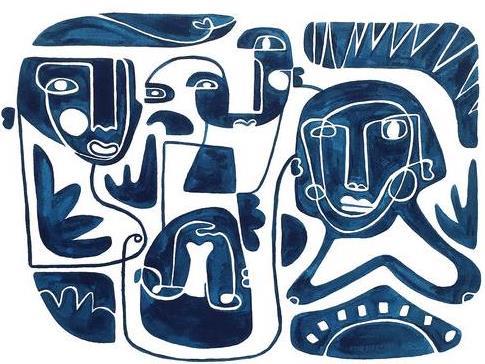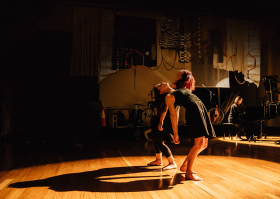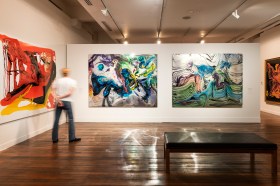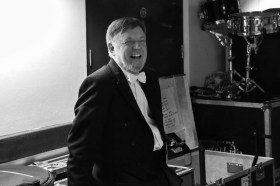‘World Spins Madly On’ by Angus Marin
“Don’t think of introversion as something that needs to be cured.”
– Susan Cain
Being an introvert and working in the arts can be daunting. For anyone who does their best work alone, needs more time for reflection or observation or prefers to be a bit quieter, the day-to-day expectations to network, be outspoken in meetings or collaborate with team members don’t always mesh.
Yet there is plenty of opportunity for introverts to flourish. In fact, many of their tendencies are ripe for the various careers within the arts in particular.
As Susan Cain explains in Quiet: The Power of Introverts in a World That Can’t Stop Talking, ‘Introverts listen more than they talk, think before they speak, and often feel as if they express themselves better in writing than in conversation. They tend to dislike conflict. Many have a horror of small talk, but enjoy deep discussions.’
Such reflection is powerful for individual artists, whereby an ability to turn inward and mine their inner life for creativity is paramount. ‘Introversion is my greatest strength. I have such a strong inner life that I’m never bored and only occasionally lonely. No matter what mayhem is happening around me, I know I can always turn inward,’ adds Cain.
Introversion is different for everyone
Like personality trait presented on a spectrum, introversion is not one-size fits all – it can adapt and change as we do.
Introversion is often mistaken for shyness, but in fact many introverts can participate in traditional extroverted activates such as performing and networking, the difference is that afterwards, they drained and depleted of energy.
‘My description of introversion is a reminder not to mistake it for shyness. Introversion to me is the preference not to be external with my thoughts,’ said arts maker and manager, Jonathan Homsey.
How introverted or extroverted you are is linked to your neurodiversity – it has nothing to do with how shy or socially, explained doctor of psychology Perpetua Neo.
“A lot of people conflate introversion with social anxiety, and that’s just not true,” Neo said. “You can be an extrovert and have social anxiety, or be painfully shy, or socially awkward. The difference is an introvert will tend to recharge on their own and an extrovert needs busy surroundings and busy situations in order to recharge.”
For introverts, intense socialising can create an “introvert hangover,” explained Neo, as the parasympathetic nervous system– responsible for “rest and digest” functions is stimulated.
‘When we can actually spend time recharging, whether its sitting at home, cleaning your house, or watching Netflix, or lying down and reading a really good book, your acetylcholine pathway kicks in,’ Neo said. ‘Essentially this calms your body down and makes you quite happy.’
Acknowledging your own temperament is key, says assistant editor at Affirm Press, Cosima McGrath.
‘Introversion, to me, is intricately tied up with your disposition or temperament. So if you’re quiet by nature you’re probably going to develop introverted tendencies and you’ll probably find you draw energy from solitude rather than big group settings or from being the centre of attention.’
Introverts tend to recharge through solitude and reflection, whereas extroverts typically recharge through spending time with others, explains designer, illustrator and founder of Make Nice, Ngaio Parr.
‘[For introverts] interaction is physically and mentally exhausting, as opposed to energising. It doesn’t mean an introvert isn’t good at speaking to others, or that they don’t enjoy it – just that is depletes their energy levels instead of boosting them.’
More people would possess introverted tendencies than you think. ‘I have made many films about famous artists’ lives and I wonder whether the majority are what we would call introvert or extrovert. I would argue the former,’ said art documentarian Phil Grabsky.
‘I think introverts pay attention to the world. Our nature is to watch and learn. Yes, maybe we miss opportunities by occasionally being slow to act but we are more cogniscent, in my opinion, of the world around us. Perhaps one could also argue that an introvert lives a little vicariously through the lives of others – but I’m not sure,’
Introverts and extroverts alike can learn to adapt their tendencies, as visual artist Angus Martin explained.
‘Introversion to me is having two versions of who I am, the ‘on’ me that people interact with daily, and the true me who only very few see. It’s being conceived as anti-social and shy, when really most people don’t realize is there is a depth of ideas, thoughts, and feelings that I may only share with a select few.’
HOW TO THRIVE IN THE ARTS SECTOR
While there’s no inherent good or bad personality trait, at times it can feel like the world is set up for extroverts. How do you thrive in environments that weren’t designed for introverts?
Self-professed introverts share how they have leverage their introverted traits – and their relatives such as sensitivity and seriousness – to progress their careers, and their tips for surviving and thriving when working in the arts.
As Susain Cain says, everyone shines, given the right lighting – here’s how.
1. Utilise your observational strengths
‘Introverts are good listeners and careful observers of people and the world. These qualities have been invaluable in my work as an editor because they have allowed me to approach manuscripts with a keen eye for character development and scene setting.’ – Cosima McGrath
‘A key element of the films I make is to encourage folk to look, to pay attention, to step back from situations and observe. I would contend that is something that so-called introverts do perhaps better than so-called extroverts. I am naturally shy, I take a while to be drawn on to the dance floor, I enjoy my own company – but I would contend all those things make me a better film-maker, a better artist.’ – Phil Grabsky
2. Tailor your calm energy to your work
‘On another level I’ve been told I have a ‘calm energy’, which can be useful as an editor. I’m not a big personality and I’m not going to be a bulldozer in conversations; as an introvert I can let the author reveal their vision for their story and quietly determine the best way to help bring their ideas to fruition. Editing is one of those behind-the-scenes professions so, ideally, you shouldn’t be able to see the work of an editor on the page. Introverts make excellent editors!’ – Cosima McGrath
‘I offer custom artwork, where I ask a series of questions, and dive deep into the conceptual side of translating something special into artwork, and I feel this helps people see the deep, emotional side of my visual story-telling through what I come up with.’ – Angus Martin
3. Learn which situations can be challenging as an introvert
‘I think we all have moments in our careers when we need to sell ourselves, whether it be during the job-seeking process or in a meeting or in negotiating a raise, and self-promotion is not something that comes naturally to an introvert. It’s hard to invite attention and speak confidently about yourself.’ – Cosima McGrath
‘Personally I have a lot of trouble when it comes to public speaking – my voice becomes fluttery, my whole body overheats and starts to shake, and I find it impossible to catch my breath or slow my thoughts. This can be a challenge when I need to speak at a book launch or on a panel.’ – Cosima McGrath
4. Set up more one-on-one situations to form meaningful work relationships
‘I love sitting down one-on-one with an author when I have the time and space to share my ideas. Most art related events are tricky but there is a good community of introverts – at least in the writing scene – so it is a huge relief to know that other people are just as terrified as I am of walking into an event alone.’ – Cosima McGrath
‘I also find it hard to network in the traditional sense, and instead contact people for one-on-one coffees, lunches, or art Skypes as I know we’ll both get more out of the interaction this way.’ – Ngaio Parr
5. Seek out mentorships
‘I think mentorships are hugely important for introverts in the arts. Mentorship programs and mentorship relationships – even it is an informal set up, maybe a mate at work who can offer advice – allow introverts the time and the space to be heard. It can be hard for introverts to make an impression in group settings, especially when there are big personalities to contend with, and often introverts do better one-on-one – at least that’s my experience. So creating safe spaces for our softly spoken friends and offering support in the form of mentorships would go a long way to making the arts a more welcoming industry.’ – Cosima McGrath
6. Create a schedule that acknowledges your need for downtime
‘I like being around other people and working collaboratively, but I also know it exhausts me. I try to schedule all meetings on one day in the week, preferably in the afternoons when I know I’m less productive anyway, and I don’t have to get back into the studio exhausted and try to think creatively.’ – Ngaio Parr
7. Experiment with how you work best
‘Figuring out how you work and live best is the most important thing. How I work best will be different to another creative, and another introverted creative – but taking the time to test out different ways or working and listening to your body when you are feeling out of step is important – it is the only way to know how you can be the best version of you.’ – Ngaio Parr
8. Be prepared for daunting interactions
‘Always have a few weirder than usual questions up your sleeve. When I used to work for music festivals, I’d always ask the bands I was starstruck what I should visit in their hometown, or their favourite roadtrip song –something different to the usual questions they are served. By the time you ask that, you usually are feeling more confident in the space.’ – Ngaio Parr
9. Embrace the joy of missing out
‘Perhaps another advantage – and I acknowledge there is not time in these short answers to really engage with the nuance of any real life – which is that the introvert maybe stays in and works harder than the extrovert who has to leave their home or hotel room and pass the night in bars and clubs. I’m making myself sound very dull – I’ve had my fair share of all-night parties – but I don’t have to go out. And frankly a successful career in the arts is above all based on sheer hard graft. Even those artists who famously portray themselves or are portrayed as endless party-goers usually, when you study the facts, are working their fingers to the bone behind the scenes.’ – Phil Grabsky
‘Environmentally, I look forward to painting on the weekends when there are no time restrictions and having no plans (or cancelling plans!)’ – Angus Martin
10. Find what helps you recharge
‘Breathing is how I recharge; mindfulness is how I survive. I know it may sound so stereotypical, but starting a strict yoga practice three years ago changed my I could survive doing arts related work. Through using mindfulness and breath-work, I am able to calm myself down and not panic when it is my turn to speak.’ – Jonathan Homsey
‘I definitely feel drained by social encounters, big or small, and feel energized by solidarity. Working in a fast paced, extroverted industry daily can be tiring, and having art as my side hustle is a life-saver when my tank runs empty, and my way of recharging and seeking balance.’ – Angus Martin, visual artist
11. Substitute ‘networking’ for finding common ground
‘I have survived and conquered my anxiety with public speaking and networking by finding common ground with each person I interact with. Just like your arts practice, finding common ground takes practice. Find common ground with a stranger at a tram stop or a relative you have not spoken to in a long time. When we are at an art event, we are all there because we love art. Remember that and you can always find something to share.’ – Jonathan Homsey
12. Rethink arts spaces and organisations to help everyone thrive
‘I think any workplace or industry would benefit their profitability and their employees or collaborator’s productivity and happiness by educating themselves on how different people work best, and providing opportunities and flexibility to work in these different ways.’ – Ngaio Parr
‘Accept people’s preferences in that current moment. Introversion and extroversion to me is on a spectrum and arts managers need to be malleable with their artists.’ – Jonathan Homsey
12. Know when to retreat, and when to push your comfort zone
‘For networking events I’d recommend casing the joint to find the nearest bathroom so that you can hide if you need a moment to yourself. That said I do think it’s important to challenge yourself in social situations: if there’s someone whose work you admire and you’d love to speak to them do try to step outside your comfort zone and introduce yourself. Try not to let your introversion hold you back from exciting opportunities.’ – Cosima McGrath
‘Trust your instinct about what feels comfortable and don’t take on too much so your art becomes a chore, or something you dread. Trust that people are admiring your work because it’s a part of who you are, and how your mind works, and let this fuel your passion and welcome opportunities.’ – Angus Martin
13. Introvert, extrovert, or somewhere inbetween – make your own measures of success
‘I am constantly studying, learning, wanting to be better. I don’t count myself as a great artist but all he great artists I’ve made films about have a restless desire to get better, to explore their craft more and more. So keep grafting in your artistic metier – don’t measure success by the handshakes and air kisses at a premiere but is your art any good? Then you’ll have all the confidence you’ll need. Take heart from the fact that most of the great artists you’ve heard of were far more introverted than you may think. But find an extroverted producer.’ – Phil Grabsky





